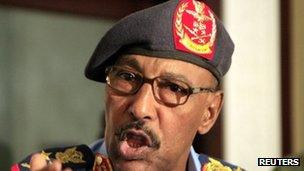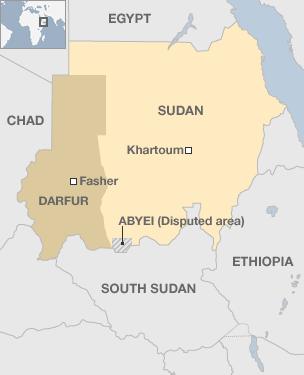ICC seeks Sudan defence minister arrest over Darfur
- Published

Abdelrahim Mohamed Hussein also served as Sudan's interior minister
The International Criminal Court's chief prosecutor has requested an arrest warrant for Sudan's defence minister for alleged crimes in Darfur.
Luis Moreno-Ocampo said Abdelrahim Mohamed Hussein was suspected of war crimes and crimes against humanity committed in 2003-04.
The Hague-based ICC has already indicted Sudan's President Omar al-Bashir on genocide charges in Darfur.
A senior Sudanese official has dismissed the warrant as "ridiculous".
Rabbie Abdal Attie told the BBC the ICC was a "tool of the West" and was trying to destabilise Sudan but that the warrant would not affect the country.
In another development, Kenya and Sudan have resolved their diplomatic row triggered by a Kenyan court issuing its own warrant for President Bashir after he was allowed to visit Nairobi in August in defiance of the ICC request.
'Pattern' of attacks
The latest warrant request was made by Mr Moreno-Ocampo's office in a statement on Friday.
It asked the ICC "to issue an arrest warrant against the current Sudanese Defence Minister Abdelrahim Mohamed Hussein for crimes against humanity and war crimes committed in Darfur from August 2003 to March 2004".
The statement added that Mr Hussein , externalwas among those who "bear greatest criminal responsibility" for atrocities in Darfur.
At the time, Mr Hussein was both Sudan's interior minister and its representative in Darfur.
Mr Moreno-Ocampo said he was requesting the warrant now "to encourage further public focus" on Sudan's policy and actions, and to "promote cooperation" to arrest the three Sudanese officials the ICC has already indicted.
ICC judges will now study the prosecutor's request before deciding whether to issue a warrant.
Together with President Bashir, the court has also indicted another former Interior Minister Ahmad Muhammad Harun and Ali Muhammad Ali Abd-Al-Rahman, a suspected leader of the Janjaweed militia, over alleged atrocities in Darfur.
The ICC says that Mr Harun reported directly to Mr Hussein.
They all deny the charges and refuse to surrender to the ICC.
The mainly Arab Janjaweed militia is accused of carrying out a policy of ethnic cleansing and genocide against Darfur's black African population after rebels took up arms in 2003, accusing the government of ignoring the region.
According to the ICC, attacks followed a pattern, with Sudan's military surrounding a village, the air force bombing it and then soldiers and Janjaweed fighters going in on foot, killing, raping and looting.
The Hague-based court has also indicted two Darfur rebels, who are accused of attacking African Union peacekeepers in Darfur. The suspects surrendered to the court last year.
Despite the warrant, Mr Bashir has visited several countries, especially in Africa, without being arrested.
After the Kenyan court issued a warrant for Mr Bashir's arrest on Monday, Sudan ordered the expulsion of Kenya's ambassador in Khartoum, and threatened to expel Kenyan peacekeepers from Sudan and not to allow planes flying to Kenya to go through Sudanese airspace.
But on his return from an emergency trip to Khartoum, Kenyan Foreign Minister Moses Wetangula on Friday said relations were now "back to normal" and that no diplomats would be expelled.

He said that while the government respected the court, he said he would guarantee that Mr Bashir would not be arrested on Kenyan territory.
Mr Wetangula said Kenya would not withdraw from the ICC but, like other African countries, it was concerned that the court was unfairly targeting the continent.
"We have voiced concerns about the manner in which the ICC has been pursuing African leaders and leaving leaders with much, much heavier responsibility of human rights and murderous actions," he said, pointing to the conflicts in Iraq and Afghanistan.
The African Union has urged the UN Security Council to defer the warrant against Mr Bashir in order to help the search for peace in Darfur.
Mr Moreno-Ocampo is set to be replaced as ICC chief prosecutor by his deputy, Fatou Bensouda, from The Gambia.
She is the only candidate in the 12 December election and is to take up her new duties in June 2012, the ICC says.
Some 2.7 million people have fled their homes since the conflict began in Darfur in 2003, and the UN says about 300,000 have died - many from disease.
Sudan's government says the conflict has killed about 12,000 people and the number of dead has been exaggerated for political reasons.